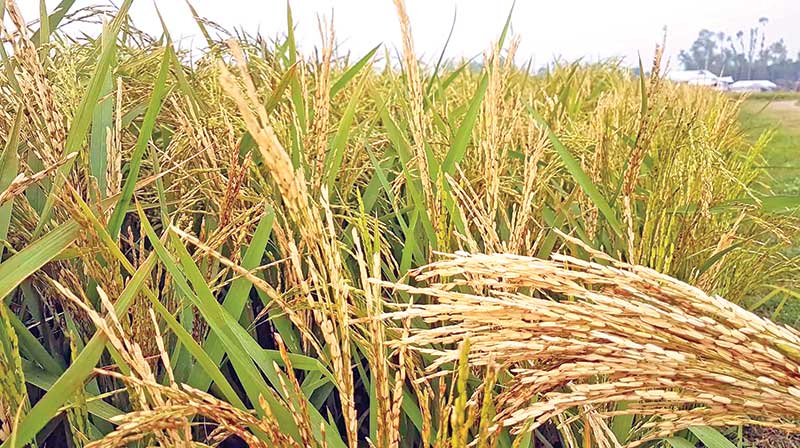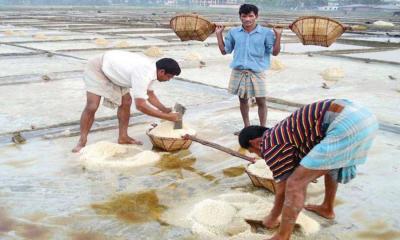-Extra bill for using electricity for irrigation
- Heatwaves should be seen as natural disasters
- Boro fields is in heat shock blast infection risk
-Mango,Litchi, paddy, poultry & cow are in threat
April-May is the most auspicious time for agriculture. Ripe Boro paddy is now in the field. There is no shortage of Rabi crops either. Juicy fruits like mango, litchi and jackfruit will be available in the market by April. After a couple of months, preparations are going on in farms around the Eid of Sacrifice. Farmers were hoping to get better prices this season as the demand for eggs and chicken increases after Eid. But agriculture is in great danger in this auspicious time.
Agriculture, dairy, poultry and fisheries sectors have suffered due to intense heat. Farmers and domestic food producers are disoriented. Under the influence of hot sun, rice plants are drying up, vegetable plants are dying. Water required for irrigation is not available in deep tube wells. The amount of water that is available also has to spend a large sum of money. There is a risk of heat shock blast infection in Boro fields. Mango and litchi are falling. Due to excessive heat and load shedding, blight has appeared in almost every farm in rural areas. Chickens and cows are dying.
Due to the lack of oxygen in the water and for intense heat waves, the production of fish larvae is being disrupted. Hatchery owners said March to August is the peak season for hatchery production. 60 percent of the country's total demand of Renu Pona is supplied from Jashore. About one and a half lakh kg of fish larvae was produced in 40 hatcheries of Chanchra fisheries last year.
Firoz Khan, President of Jashore District Fish Hatchery Owners Association said that due to severe drought, buyers are not buying fish larvae’s. That is why the price has fallen. At present it is being sold at Tk 2 thousand per kg. But last season the price was Tk 4 thousand per kg. Hatchery owners will suffer a financial loss of around Tk 20 crore.
Mezbah Uddin of Rupali Fish Hatchery said that even with all the motors we have, it is not possible to cool the water. It is not possible to save Renu Pona in such heat, what will be saved will not cost anything.
Former Agriculture Secretary Anwar Farooq said that farmers are not well. Electricity rates have been increased several times last year. The farmer has to pay the extra bill for using electricity for irrigation. Natural disasters occur throughout the year. In such a situation, the production cost of the farmer has increased. Farmers will suffer if they do not get the price now. The government should take a new plan around the temperature.
Dr. Jahangir Alam, Agricultural economist said that heatwaves like storms and floods should be identified as natural disasters. Farmers do not treat heat waves the same way they treat cyclones and floods, to make separate plans and allocations for heat waves. There is a general lack of awareness about this. Training should be given on crop care if the temperature is high.
Experts said that climate change has adversely affected the production of agriculture and agricultural products. Every year during summer, agricultural production suffers. However, the agriculture department has no plans for this season. Heatwaves are not seen as natural disasters like storms and floods. As a result, the farmer became destitute due to losses in this season of agriculture.
However, the Ministry of Agriculture says that at the moment, the concerned people including the Directorate of Agricultural Extension are giving advice on what to do to protect the various crops.
The Boro paddy of the land is burning in the scorching heat of summer. Water does not rise in the well. Due to lack of electricity, the farmers are in irrigation crisis. Somewhere in the field, even though there is rust, the trees are not growing and are drying up. Insect infestation has increased somewhere.
Jahangir Musa, a farmer of Hazirhat, kamalnagar, Lakshmipur said, "The paddy field is not able to hold water." Some fields are turning red and dying. Because of so much sun, I am afraid of becoming destitute. And the vegetables of the field are getting burnt and dying in the sun. Besides giving water to his own land through a deep tube well, also sells water to other people's land. He said, 'My motor runs 24 hours. At this time last year, a field had to be watered two days in a row. Now have to pay one day after another. It is increasing my expenses.
Badal Chandra Biswas, Director General (DG) of the Directorate of Agricultural Extension said that farmers should be advised through leaflets and apps to deal with adverse effects on agriculture. He said, in those areas where rice comes late, we have said that there should be water at the base of the rice, so that the water can easily pull the roots of the rice plant.
Excess heat is damaging mango yield in Rajshahi, Chapainawabganj and Naogaon. The leaves are curling in the drought, the mango pulp is falling. Many orchards have already lost at least 20 percent of their pods. Farmers and traders are worried about this. Officials of the Rajshahi Fruit Research Center said that if the drought continues for a long time, the fruit will also drop. In that case the garden should be irrigated frequently.
Shafiqul Islam, Chief Scientific Officer of Rajshahi Fruit Research Center, said that mangoes have been cultivated in 93 thousand 266 hectares of land in Rajshahi, Chapainawabganj, Naogaon and Natore. The production target has been set at around 1.25 lakh tonnes. As there is no rain, the size of the mangoes will be smaller this time. Also production will decrease. Since there are no mangoes on the trees, prices will be high from the beginning of the season.
Litchi pods are falling from trees in Ishwardi, Pabna. According to the Agriculture Department, if the continuous drought and intense heat wave continue for another week, the yield and production of litchi in Ishwardi will decrease by 30 percent. Upazila Agriculture Officer Mita Sarkar said that 3 thousand 100 hectares of litchi have been planted in Ishwardi this year. However, the way litchi pods are falling due to the ongoing intense heat wave, the fear of not fulfilling the hope of a good harvest has formed in the minds of the farmers.
Meanwhile, the farmers are not able to survive in the field for long due to the heat. After cutting paddy for half an hour, they have to rest in the shade for half an hour. A Farmer Kishoreganj said, "We are not able to work continuously. After working for half an hour, everyone runs for shade. My land will have 50 mounds of paddy. The cost is about Tk 35 thousand. As a result, you will face loss.
700 chickens died of heat stroke in Selina Hossain's farm in Amanatganj, Barisal due to heat wave and load shedding. The distraught farmer said, "During the corona, there is a big loss. I was able to stand up again with great difficulty. I raised 800 broiler chickens. It's all over now. Electricity goes, comes. If it is hot, the fan should be kept on. Water should be added to the tin. But more strokes are increased due to load shedding. I took medicine, but the chicken could not be saved. I do not have the ability to raise chickens again.
Farmers in the country's dairy, poultry and fisheries sectors are now in destruction. Plague has appeared in almost every farm in the countryside. Hundreds of chickens are dying almost every day, cows are also dying.
At least 20 cows have died in different areas of Rangpur in the last 10 days. Several hundred have been affected. Cow Farmers are worried due to the appearance of cow plague before Eid al-Adha. The same situation has occurred in poultry farms. An average of at least 10 chickens is dying every day in every farm due to intense heat and load shedding. There is waiting a massive destruction as heatwaves, load shedding and possible plague are out there.
ZH






